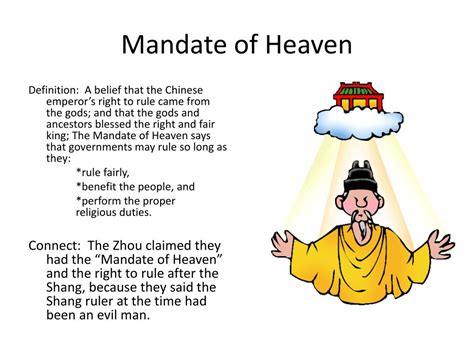The concept of the Mandate of Heaven is a foundational element in ancient Chinese philosophy, particularly within the context of political legitimacy and the relationship between rulers and the divine. This principle, known as "Tianming" in Chinese, posits that the right to rule is granted by Heaven itself, contingent upon the ruler's ability to maintain order, ensure the well-being of the people, and uphold moral virtues. The Mandate of Heaven is not a static concept but has evolved over time, influencing Chinese history, political structures, and societal norms.
Origins and Historical Context

The Mandate of Heaven originated during the Zhou Dynasty (1046–256 BCE), as a way to legitimize the Zhou’s overthrow of the Shang Dynasty. The Zhou rulers claimed that Heaven, displeased with the Shang’s moral decay and neglect of their duties, withdrew its mandate, thereby justifying the Zhou’s rebellion as a divine right. This concept allowed the Zhou to establish a moral and philosophical basis for their rule, emphasizing the importance of virtuous leadership and the responsibility of rulers to maintain harmony and balance in society.
Key Principles and Implications
The Mandate of Heaven is based on several key principles. First, it establishes a direct relationship between the ruler and Heaven, suggesting that the ruler’s authority is not solely derived from human sources but is divinely sanctioned. Second, it introduces the concept of moral accountability, where the ruler’s right to rule is contingent upon their adherence to moral principles and their ability to ensure the prosperity and stability of the state. Finally, it provides a mechanism for the transfer of power, as the withdrawal of the Mandate of Heaven can legitimize the overthrow of a ruler or dynasty deemed to have failed in its duties.
| Aspect of the Mandate of Heaven | Description |
|---|---|
| Divine Sanction | The ruler's authority is granted by Heaven. |
| Moral Accountability | The ruler must uphold moral virtues to maintain the mandate. |
| Transfer of Power | The mandate can be withdrawn, legitimizing the overthrow of a ruler or dynasty. |

Influence on Chinese History and Society

The Mandate of Heaven has had a profound impact on Chinese history, influencing the rise and fall of dynasties, the development of political institutions, and the social and moral fabric of society. It provided a framework for evaluating the legitimacy of rulers and for justifying rebellion against those who had lost the mandate. Moreover, it underscored the importance of Confucian virtues in governance, emphasizing the ruler’s role as a moral exemplar and the state’s responsibility to promote social harmony and welfare.
Modern Relevance and Interpretations
In modern times, the concept of the Mandate of Heaven continues to be relevant, albeit in adapted forms. It has influenced political discourse, with leaders often invoking the notion of a divine or moral mandate to legitimize their rule or policies. Additionally, it has contributed to discussions on political legitimacy, the role of morality in governance, and the relationship between the state and society. The Mandate of Heaven also serves as a historical lens through which to understand the complexities of Chinese political culture and the enduring themes of legitimacy, morality, and governance.
Key Points
- The Mandate of Heaven is a philosophical concept that legitimized the rule of Chinese dynasties through divine sanction.
- It emphasizes moral accountability and the ruler's responsibility to ensure the well-being of the people.
- The concept has evolved over time, influencing Chinese history, political structures, and societal norms.
- It provides a framework for evaluating the legitimacy of rulers and justifying rebellion against those who have lost the mandate.
- The Mandate of Heaven underscores the importance of Confucian virtues in governance and the state's role in promoting social harmony.
The Mandate of Heaven, as a historical and philosophical concept, offers insights into the intricate dynamics of Chinese political thought and practice. Its legacy can be seen in the ways Chinese leaders have sought to legitimize their rule, in the emphasis on moral governance, and in the enduring themes of political legitimacy and the state's responsibility to its people. As such, understanding the Mandate of Heaven is crucial for grasping the nuances of Chinese history, politics, and society, both past and present.
What is the significance of the Mandate of Heaven in Chinese history?
+The Mandate of Heaven played a crucial role in legitimizing the rule of Chinese dynasties, emphasizing the importance of moral governance, and providing a philosophical basis for the relationship between the ruler and the people.
How did the concept of the Mandate of Heaven influence Chinese political philosophy?
+The Mandate of Heaven influenced Chinese political philosophy by introducing the concept of moral accountability, emphasizing the ruler’s responsibility to uphold virtues, and providing a mechanism for the transfer of power based on moral legitimacy.
What are the key principles of the Mandate of Heaven?
+The key principles include divine sanction, moral accountability, and the transfer of power. These principles underscore the ruler’s divine right to rule, their moral obligations, and the conditions under which the mandate can be withdrawn.


